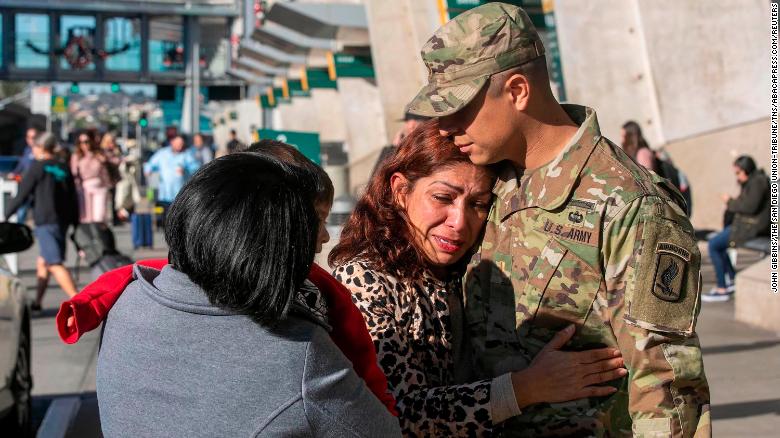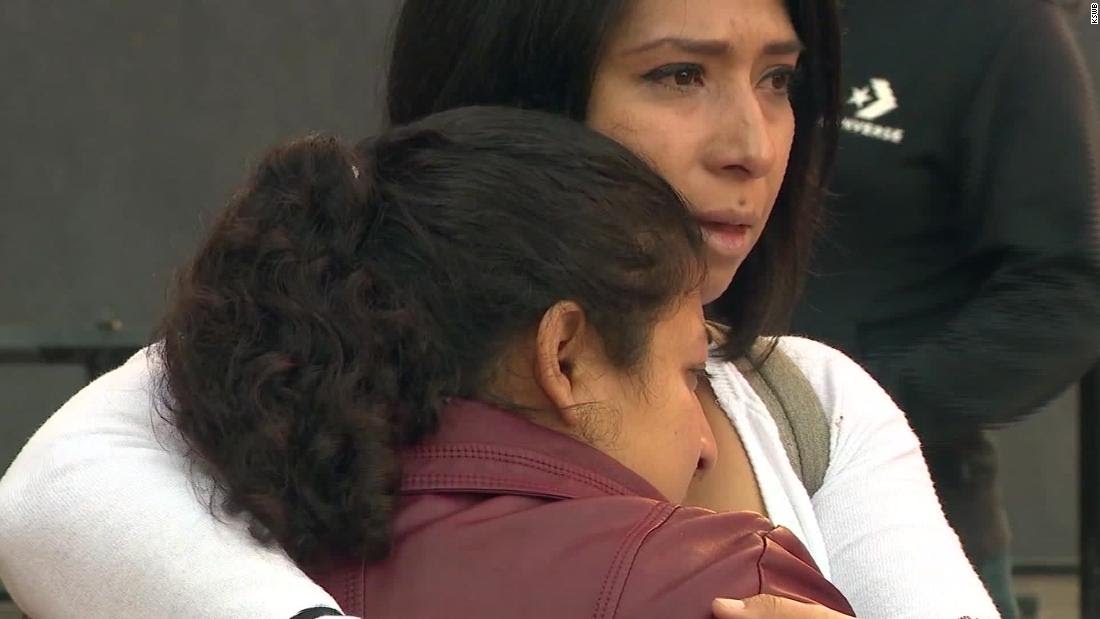The US' act of international terrorism, targeting & assassinating General Soleimani—THE most effective force fighting Daesh (ISIS), Al Nusrah, Al Qaeda et al—is extremely dangerous & a foolish escalation.
The US bears responsibility for all consequences of its rogue adventurism.

USA & CANADA (901)
Latest News
Iran appears to be standing down, says Trump
Wednesday, 08 January 2020 23:59 Written by nan.ngPresident Donald Trump on Wednesday said that Iran appeared to be “standing down’’ after retaliatory missile attacks on military bases accommodating U.S. forces in Iraq on Tuesday evening.
In a nationwide address, Trump said that no American lives were lost in the attacks, and that only minor damage was done to the bases.
He announced the immediate imposition of additional “punishing economic sanctions on the Iranian regime’’.
He said that the sanctions would remain until Iran changed its behavior, adding that he would never allow Iran to have a nuclear weapon as long as he remained president of the U.S. (NAN)
U.S. imposes sanctions on South Sudanese vice president
Wednesday, 08 January 2020 23:43 Written by nan.ngThe US on Wednesday imposed sanctions on South Sudanese First Vice President Taban Gai, the U.S. Treasury Department said in a statement.
This is in Washington’s latest move to pressure the country’s politicians to form a unity government.
The Treasury Department said Gai reportedly arranged and directed the alleged killings of opposition politician Aggrey Ezibon and human rights lawyer Dong Luak in a move to solidify his position in the government. And also to intimidate members of the opposition.
Gai, former governor of an oil-rich region in South Sudan, has long been a powerful government figure in the country with close ties to President Salva Kiir.
U.S. Secretary of State Mike Pompeo issued a statement calling on the government and opposition leaders to create distance from those who spoil the peace process.
He said Gai, on behalf of Kiir, acted to “divide and sow distrust, extend the conflict in South Sudan, and impede the reconciliation and peace process.”
Gai could not immediately be reached for comment. A government spokesman did not immediately respond to a request for comment.
Gai is the latest South Sudanese official to be sanctioned by Washington.
In December 2019, the U.S. blacklisted two South Sudanese cabinet ministers, days after slapping sanctions on five lower-level officials.
It added that they are responsible for the likely murder of the two human rights activists in 2017.
The sanctions, implemented under the Global Magnitsky Human Rights Accountability Act that targets perpetrators of serious human rights abuses and corruption, freeze any of Gai’s U.S. assets and generally prohibit Americans from doing business with him.
“Taban Deng Gai’s attempt to silence the opposition party is derailing the country’s ability to implement a peace agreement,” said Treasury Deputy Secretary Justin Muzinich in the statement.
Kiir and opposition leader Machar signed a peace deal in 2018 to form the unity government by Nov. 12.
But days before the deadline, the two leaders gave themselves an extension of 100 days to implement the agreement, a move criticised by Washington.
In November, the U.S. recalled its ambassador from South Sudan and said it was re-evaluating its relationship with the African country’s government.
Civil war broke out in oil-producing South Sudan in 2013, less than two years after the country gained independence from Sudan following decades of war.
The conflict has killed an estimated 400,000 people and forced millions from their homes. (Reuters/NAN)
U.S sends experienced firefighters to Australia
Wednesday, 08 January 2020 23:09 Written by Michael AbiodunA group of 20 experienced Californian firefighters were due to travel to Australia on Monday to help combat the wildfires that have ravaged roughly 12.4 million acres of land and killed at least 24 people and millions of birds, reptiles and mammals.
The firefighters are all leaders in their units and collectively have more than 100 years of experience, each being five- to 20-year veterans.
“It’s an impressive dream team of sorts,” said Angeles National Fire Service spokesperson Andrew Mitchell.
Many in the group performed an array of tasks during California’s fire in Saddleridge in October – one was the captain of a hotshot crew, another oversaw a firefighting unit, some worked on aviation assignments.
They all will assist the Victoria Rural Fire Service, the largest fire service in the Australian state of Victoria.
Jonathan Merager, a fire-prevention technician and 18-year firefighting veteran, said he didn’t hesitate to volunteer for the assignment when a request for help was submitted to various state and federal agencies.
“Our Australian sisters and brothers have helped us over the years,” he said. “It seemed natural to reciprocate that assistance.”
Merager, 47, said that his only apprehension is that he will be leaving behind his wife and sons, ages 9, 11, 15 and 25. He said the family has expressed concerns after seeing images of the fires’ path of destruction throughout Australia.
But they’re used to his travels throughout California and across the country to combat fires.
In 2009, he battled the Station fire that blackened more than 160,000 acres of the Angeles National Forest.
In October, while firefighters in Southern California battled Saddleridge, Merager was dispatched to North Carolina, where fires burned thousands of acres of land.
The request to Angeles National Fire Service came from the National Interagency Fire Center – the government agency that is coordinating the deployment of firefighters from the U.S.
Roughly 100 firefighters have traveled to Australia over the last four weeks after a U.S. liaison visited to help determine the scope of U.S. resources.
Those dispatched Monday from California are part of a group of 50 to 60. At least sixteen other firefighters from California were deployed earlier.
Mitchell said that while the terrain in Australia is similar to that of Southern California, environmental hazards to plants and animals differ.
“There’s a lot more snakes that could bite you,” he said.
The group will receive a brief orientation before receiving their assignments in Victoria, where they will remain for 35 days.
Merager believes that his assignment will be on the ground at the cutting line, removing brush around the perimeter of the fire.
The exchange of fire resources is made through an agreement between the of U.S. Department of the Interior and Emergency Management Australia.
“It works really well because Australia has a different fire season than we do in the United States,” NIFC spokesperson Kari Cobb said.
In August 2018, Australia and New Zealand sent roughly 140 firefighters to the United States for nearly 30 days.
The group was stationed in Northern California, Washington and Oregon.
This is the first time since 2010 that the U.S. is sending firefighters to Australia. Canada is also sending firefighters for the first time.
The firefighters earn their normal salary on the special assignment, Cobb said.
*(dpa/tca/NAN)
President Trump Gives Important Update After Iran Fired Missiles At US Military Bases
Wednesday, 08 January 2020 22:06 Written by BBC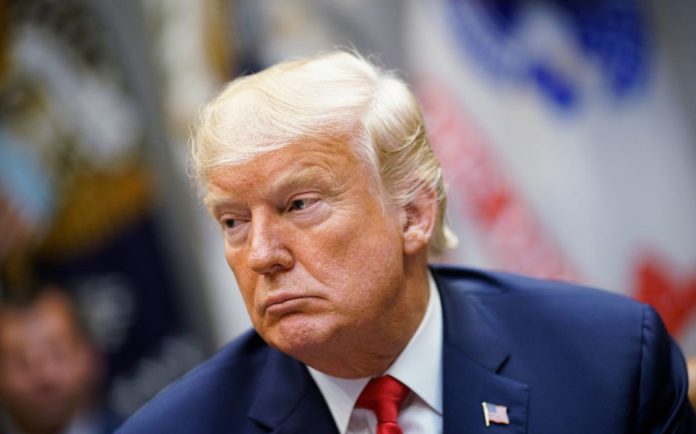
Popular News
Iran vows revenge for Soleimani's killing, but here's why it won't seek direct confrontation with the US
Tuesday, 07 January 2020 22:35 Written by theconversation 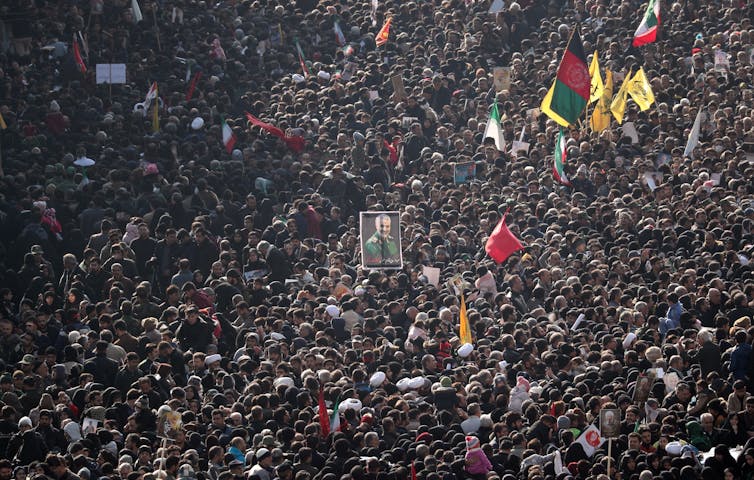
Shahram Akbarzadeh, Deakin University
US President Donald Trump has not held back on threatening Iran after the targeted killing of General Qassem Soleimani, a veteran of the Iran-Iraq war in the 1980s and a key player in expanding Iran’s links with armed groups across Iraq, Syria and Lebanon.
In addition to extreme sanctions, Trump’s latest threat includes hitting 52 military and cultural targets in Iran. As might be expected, the Iranian leadership has doubled down on its anti-US rhetoric and promises of retribution. Soleimani was too important to the regime to let this slide.
As the commander of the Quds Force in the Islamic Revolutionary Guards Corps (IRGC), Soleimani was in direct contact with Hezbollah in Lebanon. He mobilised the militant group to defend Syrian leader Bashar al-Assad against US-backed rebels and armed Islamist groups. Soleimani also visited Moscow in 2016 to make a case for, and coordinate, Russia’s military involvement in Syria.
Read more: How likely is conflict between the US and Iran?
Soleimani made frequent trips to Iraq to bolster the Kurdish and later the Shia militia push-backs against the Islamic State. The recapture of Mosul from the Islamic State in 2016 by the US-backed Iraqi army and the Shia Popular Mobilization Units (PMU) was greeted in Iran with joy.
Soleimani was celebrated as a national hero. The Iranian regime praised him for serving the national security doctrine of offensive defence: defeating ISIS beyond Iran’s borders.
Direct military confrontation is unlikely
It makes sense, then, that the Iranian regime feels compelled to respond to Soleimani’s assassination. Iran cannot afford to let its national hero be slain without retribution. When Soleimani’s daughter asked President Hassan Rouhani, “
, his response was swift: “We will all take revenge”.But what can Iran do? The Iranian leadership has been woefully aware of its limitations in case of any direct confrontation with the United States. Iran’s armed forces, including the zealot IRGC, are no match for US firepower. Direct military confrontation will amount to suicide, and the Iranian leadership is in no hurry to act crazy, no matter how deeply hurt it may feel.
This fits the pattern of the cat-and-mouse game the IRGC has been playing with the US navy in the Persian Gulf to disrupt oil shipments without raising the stakes too high. Iran threatened on many occasions to block the Strait of Hormuz and seriously hurt the global economy, but never carried through as it could have prompted a military retaliation from the US.
Iran, likewise, had a calibrated response to the re-imposition of crippling US sanctions following Trump’s withdrawal from the 2015 nuclear deal: a combination of harsh rhetoric and mild action. Tehran sought to look tough but not too threatening to invite a US reprisal.
Read more: Infographic: what is the conflict between the US and Iran about and how is Australia now involved?
But the targeted killing of a celebrated Iranian commander is a game changer, meaning the Iranian response will likely be stronger.
Given the perils of direct confrontation for the Iranian regime, the most likely recourse may be a mobilisation of Iran’s proxy affiliations to exact revenge on the United States, most likely in Iraq.
In fact, Iran does not really need to instruct Shia militia in Iraq to hurt the United States. The Popular Mobilization Units (PMU) also lost its second-in-command (Abu Mahdi al-Muhandis) in the same drone attack that killed Soleimani.
Rocket attacks in recent days on the Green Zone in Baghdad are likely to be just the prelude to a major PMU action against US assets in Iraq.
The turning tide against the US military presence, evident in the Iraqi parliament’s resolution to expel foreign forces, could embolden PMU to step up its operations even further. This would be disastrous for the war-ravaged country, and there is no guarantee that Iran would not be embroiled in the conflict.
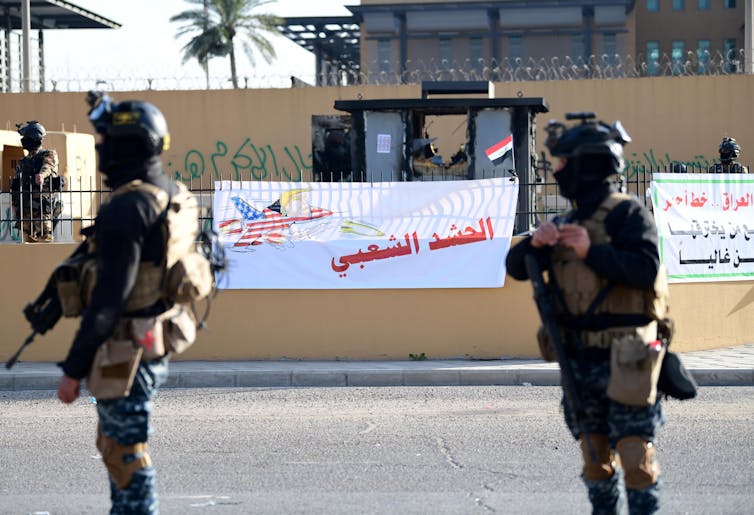
Diplomatic responses also have limited appeal
Beyond the military options, Iran also has two immediate diplomatic options. The first is to completely revoke the nuclear deal and resume its nuclear program.
With the US withdrawal from the deal in 2018 – and the Trump administration’s subsequent imposition of a “maximum pressure” strategy on Tehran – Iran already has no incentive to observe its commitments.
And Iran was edging away from the deal even before the latest escalation of tensions. After Soleimani’s assassination, Rouhani said Iran will recommence uranium enrichment and stockpiles, measures that the nuclear deal was designed to seriously limit and monitor.
The Iranian leadership claims it is still in compliance with the general rules set by the International Atomic Energy Agency to govern nuclear activity for civilian use. This move is designed to drive a wedge between the United States and its European allies. By addressing European leaders directly, Rouhani reiterated that Iran would be prepared to return to the deal, but only if Europe, Russia and China could offer a way around US sanctions. This scenario looks extremely unlikely.
Read more: Iran's leader is losing his grasp on power. Does this mean diplomacy is doomed?
Second, Iran could take its case to the United Nations and seek justice through international law.
In the wake of the Soleimani killing, the Iranian ambassador to the UN lambasted the United States for “an illegitimate action” and “an act of aggression”.
This move could resonate with the majority opinion in the United Nations, as well as many US lawmakers and international law experts, who have questioned Trump’s justification for assassinating Soleimani to prevent an imminent threat against the United States.
But going through the UN would be a lengthy and ineffective process as the United States has made a habit of dismissing or ignoring UN resolutions it does not like.In addition, it is difficult to imagine that any non-military option would be enough to satisfy Iran’s impulse for revenge.![]()
Shahram Akbarzadeh, Professor of Middle East & Central Asian Politics, Deputy Director (International), Alfred Deakin Research Institute for Citizenship and Globalisation, Deakin University
This article is republished from The Conversation under a Creative Commons license. Read the original article.
US: Iran reveals American targets to be attacked
Sunday, 05 January 2020 12:16 Written by dailypostIran says it has identified American targets to be attacked as a revenge for the killing of Gen. Qassem Soleimani, the head of Iran’s elite Quds Force, in an American airstrike.
A senior Iranian commander, General Gholamali Abuhamzeh, on Saturday, said that some 35 US targets in the Middle East, as well as Tel Aviv, were within reach of Tehran.
Abuhamzeh is the commander of the Iranian Revolutionary Guard Corps in the southern province of Kerman, Reuters reports.
He said: “The Strait of Hormuz is a vital point for the West and a large number of American destroyers and warships cross there.
“Vital American targets in the region have been identified by Iran since a long time ago. Some 35 US targets in the region, as well as Tel Aviv, are within our reach”.
Meanwhile, CNN reports that the US is seeing indications that Iran has stepped up its readiness to launch short- and medium-range ballistic missiles.
Israel has raised its security alert at missions worldwide, and will convene its security cabinet on Sunday in the wake of Iranian threats.
During his visit to Soleimani’s family, President Rouhani restated Iran’s resolution to revenge.
At the weekend, cities across the Canada, Germany, United Kingdom and United States witnessed protests over the killing of Soleimani.
Who was Qassem Soleimani, and why is his death a major development in U.S.-Middle East relations?
Sunday, 05 January 2020 04:56 Written by marketwatchSoleimani has been described as second to only the Supreme Leader Ayatollah Ali Khamenei in power in Iran.
Qassem Soleimani, leader of the foreign wing of Iran’s Islamic Revolutionary Guard Corps, was killed in a U.S. airstrike at Baghdad’s international airport Friday, local time, escalating long-brewing animosities between Tehran and Washington.
President Donald Trump authorized the airstrike that killed Soleimani, a top Iranian general who is considered one of the most revered military leaders in the Islamic Republic: “At the direction of the president, the U.S. military has taken decisive defensive action to protect U.S. personnel abroad by killing,” the U.S. Department of Defense said in a statement.
In a tweet, Iran’s Foreign Minister Mohammad Javad Zarif described the strike that killed the general as an act of international terrorism: “The US’ act of international terrorism, targeting & assassinating General Soleimani—THE most effective force fighting Daesh (ISIS), Al Nusrah, Al Qaeda et al—is extremely dangerous & a foolish escalation,” he wrote on Twitter. “The US bears responsibility for all consequences of its rogue adventurism,” he said.
The U.S. has said that the assassination of Soleimani was an attempt to deter attacks against U.S. embassies, service members or diplomats.
Here’s why the death of the general is particularly significant in the intensifying tensions between the U.S. and Iran.
Who was Soleimani?
“He’s probably the most powerful figure that is generally unknown outside Iran and the Middle East. He’s essentially Iran’s viceroy for Iraq,” Jim Phillips, Middle East analyst for conservative think tank the Heritage Foundation, was quoted as saying in a 2015 interview with NBC News.
Soleimani was born in 1957 and spent nearly his entire adulthood in Iran’s Revolutionary Guard, which he joined after the 1979 revolution in Iran, according to the Wall Street Journal.
Soleimani rose to prominence during the 1980–’88 Iran-Iraq War, and by 2013 had become one of Iran’s most important figures.
Soleimani was named major general of the Quds Force in 1998 and ran it until his death. The Quds Force has no equivalent in the U.S. but has been described as “analogous to a combined CIA and Special Forces,” according to an article in the New Yorker back in 2013. The Quds Force, which is estimated to consist of about 20,000 personnel, has been designated a terrorist group by the U.S. since 2007, according to reports.
The New Yorker article also described Soleimani as “ the single most powerful operative in the Middle East today,” citing former CIA officer John Maguire.
Reports have had also described Soleiman as second to only the Supreme Leader Ayatollah Ali Khamenei in power in Iran.
In fact, Khamenei has referred to Suleimani as “a living martyr of the revolution,” and last March expressed hope that he would die as one.
“I hope that Allah the Exalted will reward and bless him, that he will help him live a blissful life and that he will make his end marked by martyrdom,” Khamenei said as he awarded Soleimani the Order of Zulfaqar — the highest miliary honor in Iran that was established in 1856 and had not been awarded since 1979 until it was revived to honor the Quds Force commander.
To some U.S. leaders, Soleimani has been viewed as a shadowy figure. Secretary of State Mike Pompeo referred to him as “dangerous as Islamic State leader Abu al-Baghdadi,” who was killed in a U.S.-led raid in northwestern Syria in late October.
“Qassem Soleimani has the blood of Americans on his hands, Bret, as does the force that he leads, and America is determined each time we find an organization, institution or an individual that has taken the lives of Americans, it is our responsibility,” Pompeo told Fox News’s Bret Baier in an interview back in April 2018, after the U.S. designated Iran’s Revolutionary Guards Corps a foreign terrorist organization, marking the first time that the U.S. has labeled an entity of another government as a terrorist organization.
It isn’t clear how Iran will respond to the death of the revered leader, but analysts and observers on Friday were speculating that Tehran would consider Soleimani’s death an act of war.
The leader’s death sent the Dow Jones Industrial Average DJIA, -0.81% and the S&P 500 index SPX, -0.71% firmly lower in Friday trade, while U.S. crude-oil prices CL00, -0.02% and international oil benchmarks BRN00, +0.15% have been surging to multimonth highs.






